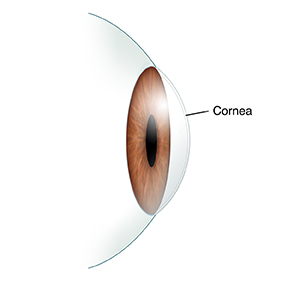Having Corneal Transplantation
Corneal transplantation is a procedure to replace a cornea that has problems. The cornea is the eye’s outermost layer. It is a clear layer on the front of your eye. It helps protect your eye from dirt and germs. It also helps control how light enters your eye.

What to tell your healthcare provider
Tell your healthcare provider about all the medicines you take. This includes over-the-counter medicines such as ibuprofen. It also includes vitamins, herbs, and other supplements. And tell your healthcare provider if you:
-
Have had any recent changes in your health, such as an infection or fever
-
Are sensitive or allergic to any medicines, latex, tape, or anesthesia (local and general)
-
Are pregnant or think you may be pregnant
Tests before your procedure
You may need some special exams before your procedure. Your eye doctor may want to use special tools to shine a light in your eye and look at your cornea. You may need to have your eyes dilated for this eye exam. You also may need computerized corneal mapping. This will give your healthcare provider more information about your cornea.
Getting ready for your procedure
Talk with your healthcare provider how to get ready for your surgery. You may need to stop taking some medicines before the procedure, such as blood thinners and aspirin. If you smoke, you may need to stop before your surgery. Smoking can delay healing. Talk with your healthcare provider if you need help to stop smoking.
Also, make sure to:
-
Ask a family member or friend to take you home from the hospital. You cannot drive yourself.
-
Follow any directions you are given for not eating or drinking before your surgery.
-
Follow all other instructions from your healthcare provider.
You will be asked to sign a consent form that gives your OK to do the procedure. Read the form carefully. Ask questions before you sign if something is not clear.
On the day of your procedure
Your procedure will be done by an eye surgeon. The surgery can be done in several ways. Ask your doctor about the details of your surgery. In general, you can expect:
-
You may have general anesthesia to put you to sleep. If this is the case, you will sleep through the surgery. Or you may be awake during the surgery. You will get medicine to help you relax. You may also be given anesthetic eye drops and injections. These are to make sure that you don’t feel anything during the procedure.
-
The surgeon will remove the entire thickness or just the inner layer of the central part of your damaged cornea.
-
The surgeon may use very fine stitches (sutures) to sew the donor cornea in place. Or an air bubble will be put on your eye to keep the new cornea in place. This is used instead of sutures.
-
The surgeon may put an antibiotic ointment on your eye. This is to help prevent infection.
-
The surgeon will close your eye and cover it with a bandage.
After your procedure
You may be able to go home the same day. Plan to have someone go home with you after the procedure. You may not be able to see well right away because of eye swelling. Make sure you:
-
Follow all of your healthcare provider’s instructions.
-
Don't rub your eyes.
-
Use antibiotic eye drops if told to. These are to help prevent infection.
-
Take over-the-counter pain medicine if needed. Your eye may be a little sore after the procedure.
-
Wear an eye patch for a day or so if told to.
-
Take medicine as directed to prevent rejection of your new cornea.
-
Ask your eye doctor what activities not to do as you recover.
Follow-up care
Make sure to keep all of your follow-up appointments. You will need close follow-up care so your eye doctor can see if the procedure worked. You may have an appointment the day after the procedure. If your surgeon placed stitches during the procedure, they will be removed at a follow-up visit days or weeks later.
When to call your healthcare provider
Call your healthcare provider right away if you have:
-
Decreased eyesight
-
Eye redness that gets worse
-
Eye pain that gets worse even after taking pain medicine
-
Sensitivity to light that gets worse